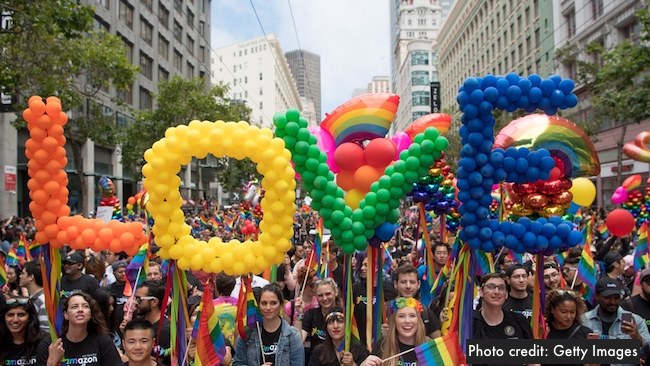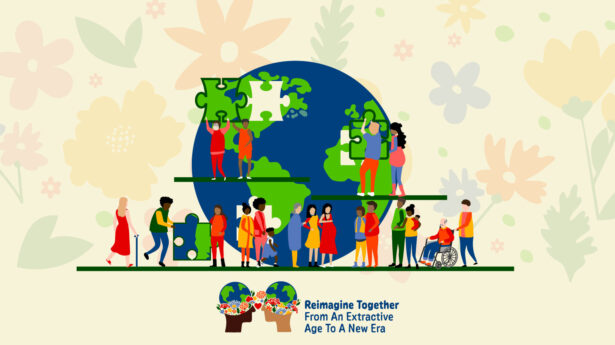The Unitarian Universalist Service Committee advances human rights through grassroots collaborations.
June 30, 2017, Rights Reading

By Kale Connerty on June 30, 2017
Our weekly roundup of what we’re reading in human rights and social justice! As Pride Month comes to a close, we’re sharing articles on LGBTQI rights. This week’s Rights Reading includes articles about intersectional identities, the LOVE Act, gay oppression in Tanzania, and photos from Pride celebrations across the world.
The “something radical” was that Arsala took the chance to celebrate two important parts of her identity. Here, Arsala shares a conversation that she had with the LGBTQ workshop moderator at an Afghan-American conference, Bilal Askarar, who realized that they were related. As the Pride celebration in Washington, D.C. and Eid – a Muslim celebration marking the end of Ramadan – occurred on the same day, Arsala and Askarar took the opportunity to have an open dialogue about what the coinciding celebrations means to them, as well as what it’s like to be queer Muslims in the United States in this moment.
Askarar said, “the past couple years I thought of it as like a separate thing, there’s Ramadan and Pride, and I can’t celebrate Pride because it’s Ramadan. I have to be good. It brings up all the juxtapositions and contrasts and dichotomies within myself. What’s the definition of a good Muslim? Can you be a messy Muslim and do you still get to celebrate Eid too?” It’s refreshing to read about people having honest conversations like these, where they can discuss and inhabit the intersectionality of their identities, the privileges they have living in America, and their continuing struggles as members of these communities.
During the “Lavender Scare” of the 1950s and 1960s, thousands of federal employees suspected of being gay were fired, based on a belief that they were more susceptible blackmail and could pose a security risk. In the last few years, Senator Ben Cardin (D-MD) has led the push to bring justice for these ex-employees. Last year he successfully called on then-Secretary of State John Kerry to officially apologize for the Lavender Scare on behalf of the State Department, and this year, he introduced The Lavender Offense Victim Exoneration Act of 2017 – the “LOVE Act,” for short.
Perez writes, “In addition to rectifying past discrimination against LGBTQ State Department employees, the LOVE Act would also establish a permanent exhibit on the ‘Lavender Scare’ in the State Department’s National Museum of American Diplomacy and provide guidance for the State Department on issues of assuring visas for same-sex spouses of personnel posted overseas.” The passage of the LOVE Act would be a step towards retribution for the gay employees who lost their jobs over half a century ago and would bring more awareness to this overlooked moment of the Cold War era. UUSC applauds these and other efforts to rectify the mistakes of the past and, along with many others, joins in solidarity with those still feeling the effects of anti-LGBTQI stigma and discrimination.
LGBTQI equality still has a long way to go in the United States, but it’s important not to forget that the fight for equality is a global one.
In Tanzania, homosexuality is a crime punishable by fines and up to 30 years in prison. Oppression against the LGBTQI community is nothing new for the country, but President John Magufuli has recently “signaled a crackdown.” His administration has disappointingly ramped up efforts to suppress gay rights activists, called on the medical community to expose people suspected of homosexual sex, and even banned sexual lubricants from the country. All of these efforts are based on pseudoscience and false perceptions of the LGBTQI community. These misconceptions result in the continued persecution of LGBTQI communities in Tanzania and many African countries, and are often the result of funding and propaganda campaigns from the U.S. religious right that promote and reinforce homophobia on the continent.
However, there is hope—UUSC Program Leader for Economic Justice Philip Hamilton recently attended Changing Faces, Changing Spaces, a conference that drew LGBTQI activists from across to share their work, stories, and strategies for how they are supporting their respective communities and working to advance LGBTQI rights throughout the continent. Read, “Celebrating Pride: Reflecting on SOGI Rights in Southern Africa” to get the full details.

People celebrated Pride across the globe. Please check out these beautiful and inspiring photo essays from this month’s celebrations and don’t forget to show your support by posting your own on social media!
- Photos: Boston Pride, Jonathan Wiggs, The Boston Globe, June 10, 2017
- Pride Weekend: The Most Beautiful Images from Celebrations Around the World, Krystin Arneson, Glamour, June 25, 2016
- PHOTOS: Worldwide LGBT Pride Parades Take Both Celebratory and Political Tones, The Denver Post, June 25, 2017
- Governor Cuomo Unveils Design for Rainbow Light-Filled Monument to the LGBTQ Community, Eileen Kinsella, ArtNet News, June 26, 2017
- New York’s Gay Pride Parade in All Its Glory, The New York Post, June 26, 2017
- 16 Photos That Show the Evolution of American Gay Pride Celebrations Over Four Decades, Leanna Garfield, Business Insider, June 27, 2017

